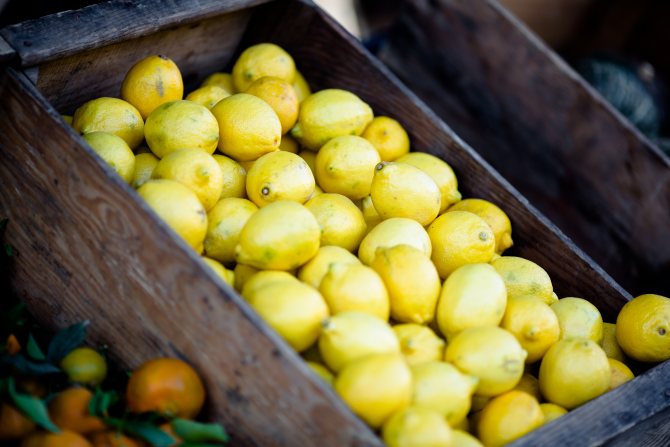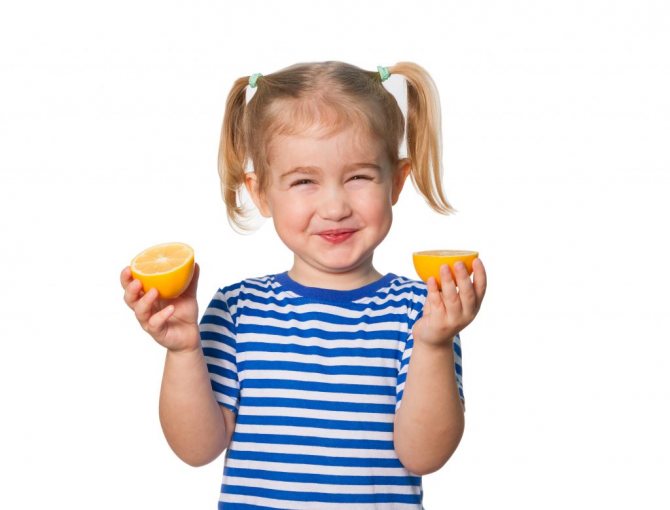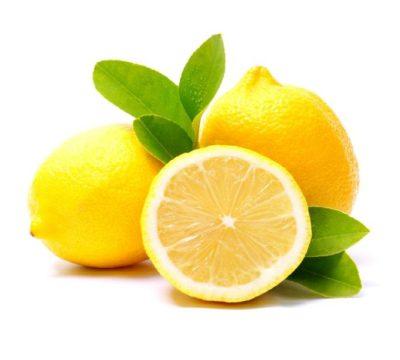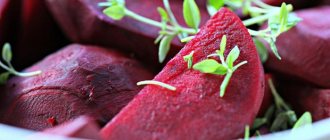Lemon is a storehouse of vitamin C, which the body needs to maintain immunity and resist colds. That is why parents are interested in at what age a child can have lemon. It is a mistake to think that lemon can be given to all children. This fruit can cause severe allergies, so there is no need to rush. The child's body should get stronger. It is also worth remembering that up to 6 months, children do not need vitamins from additional sources.
Introducing lemon into children's diets
At what age can you give your child lemon? Introduction to lemon should occur no earlier than 11-12 months. This opinion is shared by most pediatricians. However, it matters whether the baby was fed artificially or breastfed. If you want to introduce lemon into your baby's diet earlier, try giving him lemon water. Dilute 3-4 drops of lemon juice in a glass of clean water. Wait a few days to determine if your child has an allergic reaction to the product. If you see swelling or rashes around the mouth, giving your baby lemon is contraindicated.
Pay attention to the health status of your baby; if he is prone to allergic reactions and various rashes, then it is better to consult a doctor about introducing lemon into his diet. As a rule, doctors in such cases advise waiting until 3 years to introduce lemon.
About the benefits of fruit
This fruit has a unique taste and aroma, so it is often used in cooking. But is it as useful as they say it is? Lemon contains a large amount of vitamin C, which exceeds similar levels in cherries, currants, apples and other fruits. In addition, he:
- has antibacterial and antiviral properties due to phytoncides in its composition;
- normalizes the functioning of the digestive system;
- strengthens the immune system;
- is an anthelmintic;
- destroys pathogenic bacteria;
- as part of tea it has a strong antipyretic effect;
- strengthens the cardiovascular system;
- disinfects the oral cavity;
- triggers lipid metabolism, preventing the formation of fat;
- cleanses the intestines and prevents food from rotting in the stomach.
Lemon is often used in the treatment of urolithiasis, stomatitis, fungus, anemia, chronic tonsillitis and pharyngitis. Children who frequently consume this fruit are less likely to suffer from dysbiosis.
At what age can a child drink tea?
Doctors prescribe lemon for children with poor appetite or fever. It is used not only as an additive to tea, but also as a salad dressing or flavoring for meat and fish dishes.
Sour citrus perfectly quenches thirst and allows you to refresh yourself during the hot period.
Benefit
Any product can be beneficial only if consumed in moderation. This rule also applies to lemons. In small quantities it:
- Replenishes the body with vitamins C, A and B, fiber, calcium, magnesium.
- The functioning of the gastrointestinal tract is normalized, toxins are removed.
- Disinfects the oral cavity.
- Will get rid of worms.
- It will help strengthen the immune system, cure runny nose and colds.
- Easily quenches thirst.
- Lemon water eliminates toothache, which often occurs in children of different ages.
- Will relieve the feeling of hunger.
- Normalizes acid-base balance.
- Stimulates metabolic processes.
What are the benefits of lemons?
Among many fruits, lemon stands out with its special, sharply sour taste and exceptionally bright aroma. It is not for nothing that it is used as a flavoring in the preparation of baked goods and other dishes. Today we will look at it from the point of view of its usefulness for children. First of all, this fruit is famous for its high content of vitamin C - in this parameter it is superior to apples, cherries, currants and other fruits and berries. Lemon has many benefits:
- a pronounced antibacterial and antiviral effect - this is facilitated by phytoncides, for this reason lemon squeeze is included in many medicines intended for the treatment of colds;
- The pectins present in lemon normalize the activity of the digestive system and activate intestinal motility;
- bactericidal properties - if you consume lemon in the initial stage of the disease, you can do without antibiotics, which means you can preserve your baby’s immunity;
- antipyretic property - tea with lemon is recommended to be given to the child as often as possible, this helps eliminate toxins;
- due to the high content of vitamins and minerals, it provides powerful support for the body during the period of vitamin deficiency, including in the spring, when most children are weakened;
- strengthens the cardiovascular system;
- activates lipid metabolism, preventing obesity;
- prevents putrefactive processes in the intestines; children who often consume lemon are less likely to develop dysbacteriosis.
This citrus fruit is used to get rid of kidney and bladder stones. Lemon is also useful for anemia, as it promotes the absorption of B vitamins and iron. It also has a positive effect on the liver. Doctors recommend giving it more often to children suffering from chronic tonsillitis and prone to pharyngitis.
How to choose a lemon?

Lemon has a sour taste, which not all children like. It is better to start getting acquainted with this exotic fruit with the Mayer variety. It has a fairly mild taste, which most babies perceive well. Externally, this variety of lemon looks like an orange; it has smooth skin and a light orange color. By the way, it will be useful for you to know at what age you can give oranges or bananas to children.
Beneficial properties of lemon
- Of course, vitamin C! If you take 100 grams of lemon, then it will contain 40 grams of this beneficial substance. Scientists have dispelled the myth about its effect on viruses, proving that consuming citrus does not produce any results. But during illness, our body uses up vitamin C faster, so drinking lemon for a cold is not useless. This replenishes the body's reserves.
- Lemon essential oils have a beneficial effect on mood and improve sleep.
- Lemons help with constipation, dysbacteriosis, and vitamin deficiency. They have an antipyretic effect.
- They improve lipid metabolism, reducing the risk of obesity, and strengthen blood vessels.

Of course, not every child eats lemon in its pure form with pleasure; such children are rather an exception to the rule. Add fruit juice to water to create a vitamin drink. Lemons are peeled, sprinkled with sugar, eaten as a dessert or added to tea. They also make delicious jam from them. It turns out very tender, beautiful and fragrant.
How to use lemon to treat children?
I would like to immediately note that lemon is not a panacea for all colds. Vitamin C, for which everyone values it so much, is also found in other foods. Therefore, if this exotic fruit has caused an allergy in your baby, you should not use it for treatment, citing the fact that it has a rich composition. Another important point is that any product based on lemon or lemon juice can be given to children after 1 year. And only if everything is normal with his gastrointestinal tract. What diseases can be cured with lemon?
- inflammatory process in the oral cavity. If there are boils in the mouth, give your baby a small lemon slice to chew. This will help disinfect them and they will heal faster;
- lemon for child vomiting. Combine 0.5 teaspoons of lemon juice with the same amount of liquid honey and let your baby chew;
- stomach upset. To help your baby in this case, you need to combine a large spoon of lemon juice, 35 ml of clean water and a little granulated sugar. A child can be given no more than two tablespoons of this product at a time.
But doctors do not recommend using lemon for purulent sore throat. Citrus fruits irritate the mucous membrane, and this can aggravate the situation.
Lemon and ginger for colds for children
The combination of these two components allows the child's body to cope with colds. Lemon for colds in children with the addition of ginger is prepared as follows:
- Grind the ginger root using a fine grater.
- Boil water in a saucepan, add the grated ginger mixture into it, set the heat to low and continue cooking for 10 minutes.
- After the water boils, add lemon juice and, after the water has cooled, add a small amount of honey. (!!!) Never add honey to hot water.
At what age can children drink honey?
In what cases is honey contraindicated, and what age is optimal for introducing honey?
We can say with confidence that it is better not to let children under one or two years old try it at all. After 2-3 years, you can try it if there were no allergies before, especially to flowers and sweets. And it’s definitely not possible - during periods of exacerbation.
You can try giving your child honey if he is already 3 years old, just a little for the first time, literally on the tip of a spoon. Give it in the morning, after breakfast. And we watch the reaction throughout the day.
From the age of 6, honey can be given more and more often, but not more than one or two teaspoons per day or one honey lozenge. Do not give the entire honey portion at one time - divide it into several doses, at least two.
Look at the photo of what real honey should look like:
From 3 to 6 years old, you can add honey to confectionery products - honey cookies, Medovik cake.
Buy only high-quality, proven honey. Don’t skimp on what you give your child to try, especially for the first time. You should definitely have some kind of allergy medicine on hand just in case.
Diabetics should not eat honey.
If the child’s parents or one of their close relatives is allergic specifically to honey, it is better not to let the child try it for as long as possible.
Another good option for introducing honey for the first time is to add it to something that the child tolerates well and loves to eat. Cottage cheese, warm tea, porridge.
If you don’t like the taste and consistency of honey, don’t give it. Children, as a rule, have a good sense of what will “suit” or “not suit” them.
When a child, on the contrary, likes honey, you don’t need to give it every day, but if you do, take a break every month for a couple of weeks.
There is little harm from honey - there is a risk of allergies, or honey can act as a catalyst and provoke an allergy to something else. Honey is not recommended for overweight children because it contains a lot of carbohydrates.
Like any sweet, honey can cause tooth decay.
Properties of lemon water for the body
Citrus is rich in citric acid.
It is this that gives everyone the familiar sour taste. The composition contains mineral salts and ascorbic acid. True, it contains less of the latter than tangerines, lettuce, and parsley. Vitamin composition: A, B1, B2, B5, B6, B9, C, E, PP. Macroelements: chlorine, sodium, sulfur, phosphorus, magnesium, potassium, calcium. Microelements: zinc, copper, molybdenum, fluorine, iron, manganese. There are dietary fiber, ash, acids of organic origin, BZHU. Water has no calorie content, so only the energy value of the lemon is taken into account. It is 2.2 kcal. Low in calories, lemon water is an excellent diet drink.
Lemon water can be healing for the body, acting as a prevention and even treatment for some ailments. If the measure is exceeded, the opposite effect is observed. In addition, it has contraindications.
Benefit
The benefits of drinking lemon water are as follows:
- establishing a normal balance of acids and alkalis in the body;
- keeping in good shape;
- improving the process of digestion and absorption of food;
- cleansing the body of toxins and waste;
- cell rejuvenation;
- relieving inflammation;
- increasing protective properties;
- improvement of heart function;
- improving mood, stabilizing emotional background;
- relieving muscle and joint pain after a hard workout;
- makes capillaries elastic;
- improves blood quality;
- helps with weight loss, satisfying hunger and normalizing metabolism.
Each remedy is good in moderation, including lemon water. A sign that you need to stop using it is heartburn and discomfort in the stomach. The measure is also important because such water has a diuretic effect. If you drink only it, dehydration may occur. Lemon and all citrus fruits destroy tooth enamel, making them sensitive.
Contraindications
You should not start lemon water therapy in the following cases:
- disturbances in the gastrointestinal tract;
- the presence of renal pathologies;
- increased sensitivity of teeth;
- stomatitis;
- allergy to citrus fruits.

Before drinking lemon water on a regular basis, you should consult your doctor.
Chemical composition
Lemon contains a large amount of vitamins and minerals, both in the pulp of the fruit and in the peel. The fruits are saturated with alkaline elements, such as:

potassium (163 mg);- calcium (40 mg);
- phosphorus (22 mg);
- magnesium (12 mg);
- sodium (11 mg);
- sulfur (10 mg);
- zinc (0.13 mg).
Also includes:
- vitamin A (2 mcg);
- B vitamins (0.33 mg);
- vitamin C (40 mg);
- vitamin P (0.2 mg);
- vitamin E (0.2 mg).
Lemon includes up to 8% organic acids and up to 3% sugars. One of the components of lemon is citric acid. It stimulates the production of lemon juice and participates in the reactions of fat, carbohydrate and protein metabolism. Among the useful elements are terpenes, pectin, tannins. A tablespoon of the peel of one lemon contains 13% of the daily value of vitamin C, and the juice of one lemon contains 33%.
- Citric acid increases appetite, which is useful for babies who constantly do not want to eat.
- Pectin substances guarantee the removal of heavy metals from the body.
- Vitamins A and C protect against numerous microbes and viruses and act as protection for the body.
- Lemon juice is good for the body's cardiovascular system and kidney function.
- Vitamin D is considered essential for a child's body. It has a beneficial effect on the proper development of the baby, protects against rickets and strengthens children's unstable immunity.
- Useful for diseases such as chronic tonsillitis, pharyngitis, stomatitis.
We invite you to familiarize yourself with Tradescantia root











